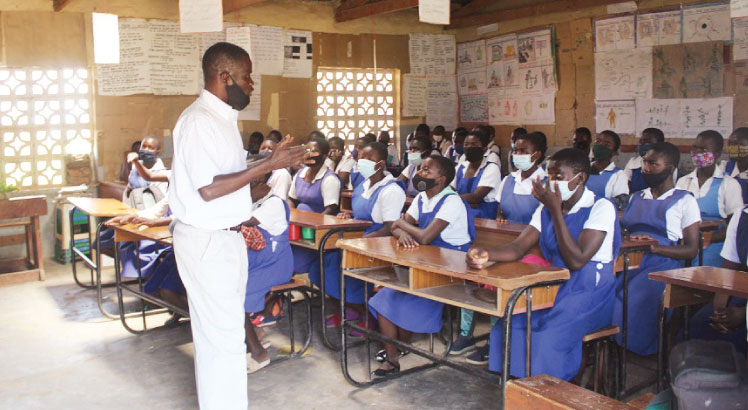Fighting deep-rooted traditions to save babies
Living in a remote area, miles away from civilisation, a community is easily brain-washed or confined to certain cultural beliefs.
And the story of Yela Village, in the remote area of Neno District, has for a long time been under the firm grip of one woman, locally known as Ayaya.

According to locals, Ayaya- a traditional doctor- has paraded her non-medication beliefs to the extent of newborns being deprived the essential vaccinations pivotal for their survival, particularly the first five years of their lives.
Ayaya is a powerful force around Yela and her influence is revered by many, evident from her description by the locals who also described as a ‘sacred cow’ who cannot be met with willy nilly.
She has built an empire on one of the hilly locations in Yoyola Village from where she treats her patients and a request to meet her was met with a chain of excuses.
Biyata Chazungu, 38, has practically been raised by Ayaya after her parents sought medical treatment. She was born in Yoyola Village where her parents settled following their treatment.
She is known as Ayaya’s granddaughter.
Explains Biyata: “She uses herbs to cure various ailments that include mental illness and whatever people believe to be an emanation of curses.”
She said People come from all over Malawi and Africa, including South Africa and Zambia.
“She is highly respected and feared. Even to meet her, one requires an appointment which may take days. Usually, her workers arrange those meetings and people camp for days just to meet her,” she said.
Growing up, Biyata learnt Ayaya convinced villagers within Yoyola and the surrounding villages of Manondo I, Manondo II and Yela that she could cure as well as prevent diseases to the extent of immunising newborns herself.
The practice is called mtsiliko wa ana in the vernacular-literally translating to magical protection of babies.
Such was the belief that spread in Neno District, exposing children to polio, measles, neonatal tetanus, whooping cough and diphtheria.
In 2016, 30 women formed Kasamba Mother Care Group to counter the immunisation beliefs that had been handed down from generation to generation in a bid to introduce the modern methods of immunization.
The women’s grouping was a result of an intervention by the Malawi Health Equity Network (Mhen) in sensitising communities on the need to protect their babies from preventable diseases.
Chairperson of Kasamba Mother Care Group Martha Richard said during a recent visit to Neno that it took the involvement of chiefs to break down the traditional beliefs instilled in the people by the powerful Ayaya.
She said the 30-member-grouping conducted meetings around Neno to convince people to adopt modern methods of immunisations and his has been their core business since 2016.
Her vice Margaret Ernest chirps in, saying many people within communities were ignorant of the vaccinations which made it hard for them to even understand them.
Said Ernest: “Even after being convinced to vaccinate their babies, we remained with the task of following up because many were skipping or not completing at all. We included follow-up visits on our programmes to enforce adherence.”
Ernest adds that in spite of intensive campaigns, there are still skeptics with attitudes that want to stick to Ayaya’s methods, but their task remains to convince them and change mindsets.
Other challenges in reaching out to the people are long distances and mobility means that leave many women and babies exposed to crossing rivers on foot-that worsen during the rainy season.
John Litchowa, health surveillance officer at Midzemba Health Centre, cycles for three hours to and for Yoyola and Mawetang’ombe to immunise babies.
He says the distance varies dependent on water levels in the two bridgeless rivers—Mawetang’ombe and Lisungwi—which he crosses everyday to work.
The same experience is shared by women living in his vicinity, but walk instead of cycling.
Indeed, such a task takes dedication for both the givers and recipients of vaccinations. Litchowa says he immunises an average of 40 babies in a day.
During the Neno visit, a group of women from Manondo II Village travelled from 6 am to 9 am to get to Yela for the interview having crossed Nkase River.
It rained during a good part of that day and had it rained at the conclusion of the meeting, they admitted they would have been stranded in Kasamba, their neighbouring village.
Thank God it never rained that afternoon and their huddles demonstrated the difficulties members of the women group go through in reaching out to other women as well as in getting medical help.
Mhen executive director George Jobe said in an interview that immunisations were rejected by the communities prior to their intervention, on the belief that Ayaya had already done the needful to all babies, including unborn ones.
He said the communities relied on Ayaya so much that they believed she could cure even headaches and for free.
Said Jobe: “Our success is from the fact that this mother group was chosen by the communities, inclusive of chiefs. We conduct sensitisation meetings and health education about the importance of immunisation and the dangers of lacking it.
“We broke down the socio-cultural factors and it was not easy because we had to produce evidence. The mother care group includes Ayaya’s granddaughter, Biyata which in effect also signifies victory to breaking down those beliefs.”





